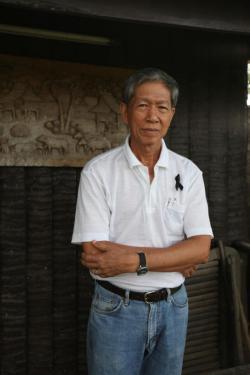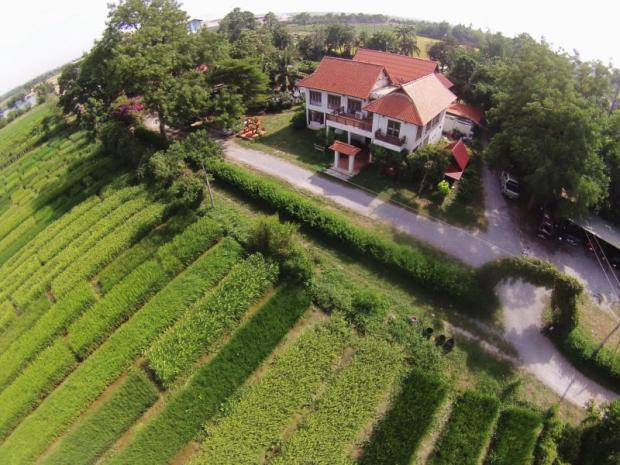
At the age of 71, Daycha Siripatra needs no eyeglasses. His nearsightedness and astigmatism are things of the past. His hands that once showed an early sign of Parkinson's disease have no tremor. He says his brain, which once began to deteriorate, is now sharp.
"I am like a new guy. My brain and my body can function very well as if I was 50 years old, thanks to the cannabis oil that I use every night. It enables me to sleep well, which eventually contributes to my strength," he said.
Daycha is the founder and the president of Khao Kwan Foundation. Set up in his hometown in Suphan Buri in 1998, the foundation aims to educate rice farmers about organic farming and promote local rice varieties. He is known as a master organic rice farmer and a fighter for the rights of farmers.
Earlier this month, Daycha made headlines when authorities seized 205 marijuana plants, 20 litres of cannabis oil, 8kg of marijuana seeds and 500g of marijuana powder from his foundation. Pornchai Choolert, his assistant, was arrested and charged for illegally cultivating and possessing marijuana while Daycha was in Laos organising an organic farming workshop during the raid.
Daycha said all the seized items were his and did not belong to the foundation. He processed and distributed cannabis oil for free to more than 5,000 patients through two temples, one in Suphan Buri and the other in Pichit, since the beginning of the year. He claimed his cannabis oil can cure all types of sickness. He knew what he did was illegal according to the 2019 Narcotics Act, which still lists marijuana as a narcotic but legalises the medical use of it. But he said it's all well-intentioned.
The police raid sparked a social movement to fully decriminalise marijuana before the 90-day amnesty period ends on May 19. Now individuals and organisations who possess marijuana for medical purposes must notify the Food and Drug Administration (FDA) before May 19, or face arrest. Before then, Daycha still has time to make his public service legal. He has to be certified as a traditional doctor, pass the training and test set up by the Department of Thai Traditional and Alternative Medicine. He also needs to have his cannabis oil checked for safety.
"I will do everything in my power for those who are sick and need medical marijuana. I will follow all requirements of legal processes because I want to make sure that the 5,000 patients will continue to have cannabis oil to cure their sickness," he said.

Daycha Siripatra. Photo: Kitja Apichonrojarek
Daycha became interested in medical marijuana when he was 65. Like other people, his first thoughts were negative. He regarded it as an illegal drug. But at the same time he wondered why the plant was legal in many countries.
"I wanted to know if medical marijuana was for real. Although I read many medical studies about medical cannabis that can cure illness including cancer, I didn't want to believe. I wanted proof," he recalled the time when he decided to try cannabis oil on himself.
His inspiration was Rick Simpson, a Canadian who used cannabis oil to cure his skin cancer and who shares knowledge on how to extract the oil, known as Rick Simpson Oil (RSO). In 2012, Daycha used cannabis oil to cure his Alzheimer's and Parkinson's diseases, which were in the early stages. He drank some drops before bedtime. One night after turning off the lights, he accidentally dropped the oil into his left eye instead of an anti-inflammatory drop, which he used to treat pterygium.
"My eye hurt badly. I turned on the bed light and looked at the bottle in my hand, I was shocked. I thought I would become blind," he said. Then the pain stopped and itchiness was gone. "When I woke up in the morning, the pinkish tissue in my eye disappeared. I thought it was a coincidence."
Daycha later adjusted a formula as advised by a monk. The pterygium was gone and never relapsed. Age-related macular degeneration and vitreous degeneration in his eyes were also cured. Even his nearsightedness and astigmatism were healed. The early signs of Parkinson's and Alzheimer's were cured too. With his experiences, he spread the knowledge and shared cannabis oil with others.
Later, he realised that the real reason for the healing of sickness was not because of the oil itself, but the healthy sleep.
"It does not mean that cannabis oil is limitless when it comes to curing sickness. The oil helps my body have a good sleep and that is the healing power," he said.
Quality of sleep plays a crucial role in physical and mental functions. It allows the body and brain to rest, recover and be well again.
When he was satisfied with the results on himself and the people around him, he organised workshops to train people to grow and extract the oil, distribute seeds and gave away cannabis oil in capsules for free at temples in Suphan Buri and Pichit. He has a volunteer team of Thai traditional doctors to diagnose illnesses and keeps records of cures. However, those who decide to use Daycha's cannabis oil are asked to refrain from using modern medicine. "I do not recommend them to use both cannabis oil and conventional medicines because I cannot know if it is safe to use together. Besides, I will not know if their sickness is cured because of the oil or not," he said.

A bird's eye view of Khao Kwan Foundation. Photo: Kitja Apichonrojarek
With the hype of cannabis oil, crowds of people flocked to the two temples to get it. Today the service is halted after the raid so some people visited the foundation instead to ask for the cannabis oil. After the raid, about 100 people showed up daily, said his assistant Pornchai.
But Daycha can't yet provide the oil until he passes all the processes and becomes a certified traditional doctor with training. The registration process, according to Dr Pramote Stienrut, deputy director of the Department of Thai Traditional and Alternative Medicine, should be done within this week. Then Daycha has to attend a two-day medical cannabis workshop to be organised on Saturday and Sunday at the department and must pass the test to get a certificate from the Food and Drug Administration, allowing him to prescribe cannabis oil for patients.
The remedy of Daycha's cannabis oil must also be proven to fit the definition of Thai traditional medicine, he said, adding that at present 16 of 91 formulas of Thai traditional medicine were initially approved by the Public Health Ministry for traditional doctors to use cannabis for healing patients.
"But Daycha's cannabis oil is not like others. We need him to prove the source of his remedy because we have to ensure that his cannabis oil is effective and safe," Dr Pramote said.
Chulalongkorn, Khon Kaen and Rangsit universities will help Daycha with the research.

Daycha shows a pattern of good sleep because of the use of cannabis oil. Photo: Apichart Jinakul
"Rangsit University has a facility that can test if Daycha's cannabis oil is contaminated or not before he gives it to people," said Prof Dr Surang Leelawat, a member of the university's Medical Cannabis Research Team. Soon the university will have its own cannabis plantation and will conduct clinical research on lung cancer.
Daycha agreed to give over all information and data his team has recorded from the 5,000 patients for public the benefit. For him, the number of patients is more than enough to prove the quality and efficacy of his oil.
He is now ready to move on to another step -- to campaign on fully decriminalising marijuana. "I want to see people grow marijuana plants at home like we plant chilli and basil because it is a herb and it is useful," he said.
But his dream can't be true until cannabis is removed from the narcotics list.
"Nothing can stop me from helping people. The law can be changed and it must be.
"Soon I and my alliances will create another movement that requires public participation. I will not stop and I hope others will not stop also," said Daycha.